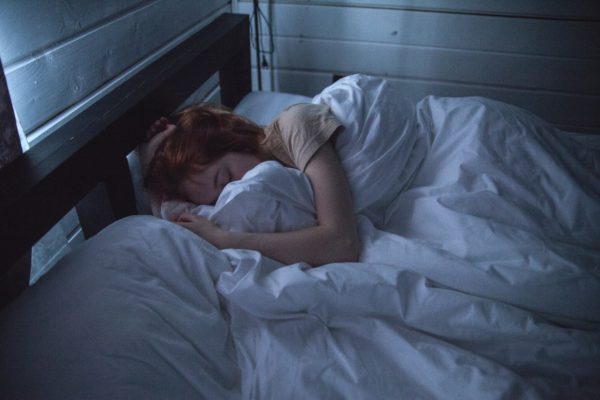How to Fix Interrupted Sleep
How to Fix Interrupted Sleep
Healthy adults need 7-8 hours of uninterrupted sleep a night. Even though you might be sleeping from 11 pm to 6 or 7 am each night, how much of that time are you actually sleeping?
Sleep disturbances, or interrupted sleep, can disrupt the quality of our sleep, diminishing the actual sleep duration we experience each night and causing us to wake up feeling extremely groggy. If you’ve been experiencing excessive daytime sleepiness, even though you’re in bed for the recommended range of hours, you might be experiencing sleep continuity disruption.
When you experience interrupted sleep, you might feel as though you’re “tossing and turning” each night. You’re lying in bed, probably with your eyes closed, but are you really getting the quality sleep you need? You might be experiencing sleep problems for any number of reasons.
In this blog post, we’re going to dig into how you can fix your interrupted sleep. Let’s begin with an exploration of why sleep quality is so beneficial to our health.
Why is sleep quality beneficial to our health?
Sleep is as important for your good health as diet and exercise is. A regular sleep schedule can improve your mood, your health, and your brain performance. Moreover, sleep disruptions and sleep deprivation can contribute to the possibility of you developing health disorders or sleep disorders. These can be anything from sleep apnea to heart disease and dementia.
Here’s a list of the different kinds of benefits sleep hygiene can have for our health:
- Improved brain performance
- Better decision-making
- Brain development
- Stronger immune system
- Reduced stress
- Can stay at a healthy weight
- Lowered risk for diabetes and heart disease
- Improved social tolerance
As you can see, proper sleep hygiene has a wide range of benefits. Here are some of the reasons why you might be experiencing interrupted sleep.
Drinking alcohol can cause disrupted sleep

Did you know that drinking alcohol can contribute to disturbed sleep? That’s right. We’ve all had that morning where we woke up feeling drowsy, like we had an insufficient sleep the night prior. That’s probably the hangover, but it also could be due to inadequate sleep.
When we say “drinking alcohol,” we don’t mean the occasional glass of wine with dinner or the monthly Happy Hour with your co-workers. You might find it tough to get a good night’s sleep after you’ve spent the evening clubbing, but regular drinking will impact your ability to have uninterrupted sleep.
Alcohol has a negative effect on REM sleep (Rapid Eye Movement), and while drinking in moderation won’t do you a whole lot of harm, regular or heavy drinking can cause you to wake up after a few hours of sleep and have a difficult time falling back asleep. Overtime, this can result in chronic sleep disturbance.
If you find you’re suffering from fragmented sleep and you’ve not been known to shy away from the liquor cabinet, it might be time to take a look at your drinking habits to alleviate your difficulties with sleep disruption.
Drinking too much caffeine during the daytime
Caffeine keeps you awake by stimulating your central nervous system, muscles, and heart. It can raise your blood pressure, but it doesn’t typically have this effect for regular users.
Caffeine has a lot of health benefits, and in moderation, it can benefit your mood, reduce your likelihood of depression, stimulate brain function, and even protect against Parkinson’s and Alzheimer’s disease.
Unfortunately, it also gives you a nice buzz that can keep you awake – which is good for when you need it, but not when you’re trying to go to sleep.
If you’re wondering why you’ve been suffering so much lately from sleep fragmentation, it might be time to address your caffeine habits. A cup or two in the morning is just fine, but switch to water after lunch for optimal sleep continuity!
Using blue light devices before you go to sleep
Using phones, laptops, or any other electronic device with blue light too close to bedtime could disrupt your sleep. There’s evidence to suggest that blue light can suppress the body’s natural release of melatonin when it starts to get dark – aka, the sleepy hormone.
Your internal body clock or “circadian rhythm” depends on bodily cues to know when to be sleep, and when to be awake. Blue light in the day might actually be helpful to signal your body to keep awake and alert, but at night this can be detrimental – even for hours after the screen has turned off.
Turn your phone to black and white to discourage usage or try to charge it in another room while you sleep. Opt for a more sleep-friendly nighttime habit instead, like reading or chatting with a bedtime partner.
A noisy bed partner could be waking you up
Have a partner who snores? You might have grown used to it with time, but their noise or shifting could be causing disrupted sleep. In fact, whether or not you notice it during the nighttime, you might not be getting the quality of sleep your body needs.
Sleep fragmentation can be an issue for adults as they age because there’s a natural shift in their sleeping patterns, resulting in less time spent in restorative sleep – aka, deep sleep. If your spouse or bed partner is waking you up by snoring or moving around too much, it might be time to have a chat!
How to Restore Sleep Patterns for Uninterrupted Sleep

Getting enough sleep to reap the benefits of healthy sleep is not just about how long you sleep. It’s also about the quality of sleep and sleeping on a regular schedule.
Obviously, if you suffer from a sleep disorder or a condition like high blood pressure which makes it more difficult for you to sleep uninterrupted, consult with a physician for tips. Otherwise, here are our tips for restoring your sleep patterns and reducing the odds of experiencing interrupted sleep:
- Drink in moderation
- Avoid caffeine after midday
- Exercise regularly
- Manage your stress
- Try breathework
- Avoid blue light 2-3 hours before bed
- Don’t eat too close to bedtime
- Create your ideal bedroom atmosphere
- Adjust to a sleep schedule
- Implement a bedtime routine
- Upgrade your bed sheets or pillow
We hope this blog has given you some insights into avoiding interrupted sleep and increasing your sleep quality! Happy snoozing!

